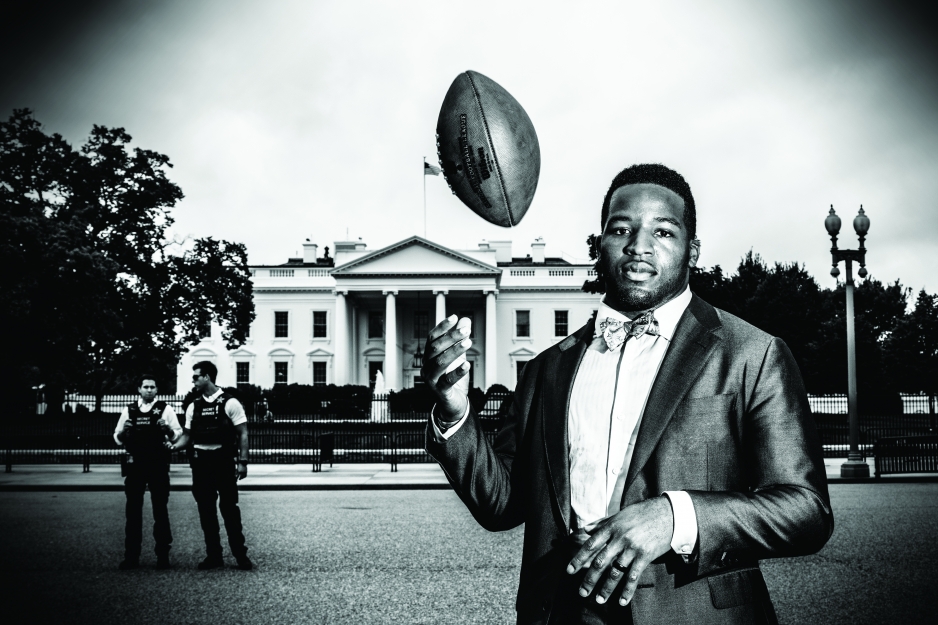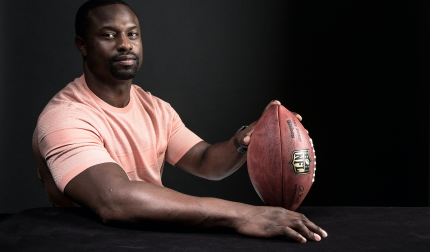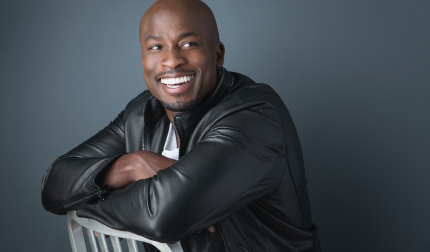It’s a rainy Tuesday afternoon in Washington DC, and the gloomy weather perfectly suits the mood in the nation’s capital. The chatter everywhere is about Congress possibly shutting down the government tomorrow over budget disagreements. An already bitter presidential campaign is now in full swing, leaving both major parties sniping at one another. And most depressingly of all, their NFL team is off to a 1-2 start.
On his day off, Alfred Morris drives from the suburbs of Virginia to meet me for lunch at a restaurant just a short walk from the White House. His vehicle is emblematic of a player who has ground his way to over 4,200 rushing yards just four games into his fourth pro season. Though he has already been named to the Pro Bowl twice, Morris is still playing on his initial four-year contract that he signed as a sixth-round draft choice out of Florida Atlantic AUniversity. So rather than bet on a lucrative future with a fancy sports car, Morris drives his 1991 Mazda 626, the one with a license plate that says “The Bentley” on it. “The car is a year older than my wife,” Morris says laughing.

Morris got the car around the same time he met his wife, Lindsey, a collegiate soccer player, while they were both attending Florida Atlantic. During his latter college years, Morris worked at Sears, carrying big-ticket items from the storeroom to the front door for customers. “I would walk to work every day,” he remembers. “During the football season, I would work there one day a week, because I had classes and practice. But in the summertime, they would let me work almost every day, so I could earn some extra money to get the things I needed at school.”
Even for a finely-tuned athlete, walking to Sears every day in South Florida’s summer heat took its toll. “I prayed for a car,” Morris says. “It was hard. I was always trying to get a ride from someone, but you know how it is. As soon as you ask, people get busy all of a sudden.”
Toward the end of his college career, Morris’ prayers were finally answered. One day, Morris’ pastor saw him walking to work. So the pastor sold Morris his Mazda for two dollars. “The car had over 100,000 miles on it already,” Morris says. “Most people thought it was a piece of crap, but it was a godsend for meMorris’ fiscally conservative lifestyle and love of his car have been so well documented that Mazda brought the car in and completely refurbished it. Now nearing 140,000 miles, the major tune-up has made the car reliable enough to make the drive from the Virginia suburbs to Washington in the district’s notorious traffic. The great irony of Morris caring so lovingly for such a car is that earlier in his career, he probably took better care of the Mazda than he did himself—an imbalance his teammates would work to help him correct.
“When I first got in the league, I would do things to take care of myself, but I was really inconsistent,” he says. “I’d get a massage after Week One, and then I might not get another one until Week Six, only after I started to feel awful. The older guys on the team taught me about the importance of consistency when you are a pro. Now, I always make sure to get a massage in. I see the chiropractor to get stretched out. I use the foam roller, the cold tub, every tool I need to take care of myself. My body is my livelihood.”
Morris now helps pass that wisdom down to the players coming into the league. “Darrel Young, our fullback, helped me a lot when I came to the NFL. Tim Hightower, who was our starting running back at the time, bought me my first massage. I was like ‘These are some good dudes!’
And Santana Moss… Santana had the most impressive team of people around him helping him prepare. At age 36, he should still be playing in the NFL. Right now, the guy would still have the best feet on the team, even 14 years in the league. He could still get in and out of cuts quicker than anybody. He took such good care of himself that he would get audited. They would say, ‘There’s no way you spent all of this money taking care of yourself.’ And he would be like ‘Yes I did. Here are all the receipts for everything I did to back it up.’ Santana Moss is a pro’s pro. The only reason he isn’t playing right now is because in people’s minds, wide receivers shouldn’t be 36.”
Despite the great care Morris now uses to protect hislivelihood, he also feels there are other forces at work helping to keep him healthy on the field. “I’ve been blessed,” he says. “I’ve never broken a bone, never torn a ligament. Most people knock on wood, but I’m more of the mindset that I don’t think about getting injured. I focus on the positive. Always the positive.”

As we sit down for lunch at Equinox, the chef brings us an assortment of appetizers not on the menu—one of the privileges of Washington’s star running back showing up unannounced at one of Washington’s finer dining establishments.
To this day, Morris seems genuinely surprised by the special attention. Two Pro Bowl appearances have not erased from his mind that he was a sixth-round pick. Getting drafted late instills you with a constant awareness of your NFL mortality.
“My first training camp, I had moments where I thought that this is it. They’re gonna cut me today,” Morris remembers. “There was one play that we ran in practice, and I could not pick up where the blitz was coming from. They ran it once, I missed the blitzing defender. Ran it again, missed it again. Ran it a third time, missed it a third time. Mike Shanahan, our coach, was like, ‘What’s going on?’ Nothing gets you cut in the NFL faster than getting your quarterback killed.” (laughs)
There was a time when running backs dominated the first rounds of NFL drafts and received big paydays before they even put on a pro jersey. But given the likelihood of injury and the league’s evolution to a passing game, it certainly feels that the shelf life of the position, and the commensurate salary, continues to shrink. But to Morris, one game in the pros is more than he ever could have dreamed of experiencing.
“I wasn’t expecting to play at all in my first season,” he says. “Then there were injuries in preseason. I had a big preseason game, and before I knew it, they were sitting me out of the fourth exhibition game so I wouldn’t get hurt.”
In his rookie season, Morris exploded onto the NFL scene with 1,613 yards rushing on 335 carries, including 13 touchdowns. The team scaled his carries back to 276 and 265 in the last two seasons. This year, they’ve lowered his carry total even more. “I feel like I get better the more I run the ball,” he says. “My mentality is if you want to give me the ball 100 times a game, that’s fine with me. I’m going to run like every carry is my last.”
That mentality is just one of the ways Morris embodies the pro athlete stereotype that every team wants in a player. His effort is relentless, and he never complains about his circumstances, something ingrained in him early by his parents.
Despite growing up in poverty in Pensacola, Florida, his mom and dad and six brothers stayed very close. “We were so, so poor,” Morris says. “We always received government assistance. There were times when we couldn’t afford any Christmas presents, so we would pool our money and buy a board game, then wrap it and put it under the tree, so it felt like Christmas.”
When people hear of Morris’ poor background, they often conjure up stereotypes of their own. “People will ask, ‘How’s your mom?’ as though I’m from a single-parent family. I’m quick to remind them that I was very fortunate to have both my mom and dad raising me.”
Morris’ dad worked in the food service industry for many years, most recently at The Olive Garden. He currently drives a hotel shuttle bus for Hilton Hotels in Virginia, near where Morris lives. “People will ask my dad, ‘How come you are still working? Your son is a pro football player!’ And my dad will just say, ‘That’s his money. He earned it.’”
Morris’ mother, a schoolteacher who has taught from kindergarten to the high school level, has always stressed education to her seven boys. “Mom taught in my high school while I was there. Whenever I would get in trouble, I would say, ‘Please don’t send me to her class!’”
C’s were unacceptable in the Morris household. “I mostly got A’s,” Morris says proudly. “I always thought I was more than an athlete. When I was in college, a teacher made me retake a test. I asked her why and she said, ‘You got a 100 on my test, and no one gets 100 on my test.’ So because I’m a football player, that means I cheated? Eventually, I made a fuss with our department head, and then the teacher said, ‘Oh, I messed up. You actually got one wrong.’ And I was like, ‘No way, I got that right. I got them all right.’ It hurt me. You just called me a dumb jock. It’s everything I’ve tried not to be.”
Every off day, after win or loss, soreness or no soreness, Morris will head out into the community to make appearances. “I hate calling it community service,” he says. “It’s really more community outreach.” Some he does with the team, some on his own, preferably without the media present. “When I was a kid and we had nothing, people came back and gave of themselves. I always said to myself, if I get to that point, I want to do that too. Truthfully, it’s not about money. Anyone can give money. For most people, coming out and loving on people makes the difference.”
Morris does everything quietly, which is why he is one of the most overlooked starts in the NFL. Recently, Dan Steinberg of The Washington Post asked Morris why he would hop the fence at FedEx Field in Washington and sit in the stands before games. It turned out, Morris had been doing it every game since his rookie preseason. He would head into the stands and sit and talk with the team’s ushers, security guards and food service workers for nearly 20 minutes. He knows them all by their first names. The chat sessions would end in a prayer and Morris would hop back onto the field to prepare for the day’s game.
“They were all doing this for very personal reasons, because they all like each other and enjoy the conversation,” Steinberg says. “It certainly wasn’t about trying to get media coverage or to get on camera. They just all enjoy each other’s company. It was a really sweet thing, at least to an outsider.”
This is the fourth and final year of the first contract Morris has signed with the Redskins. Whether he will negotiate a new lucrative deal with the team or seek one elsewhere is still uncertain. “No matter what round a player is drafted, if he owns his craft, continues to learn and develop, he will be successful,” says Morris’ agent, Sean Stellato. “Alfred is a prime example. He’s the model of the sixth-round draft choice who put himself in a position to succeed.”
After we finish lunch, Morris gladly takes photographs with the husband and wife team who own the restaurant. We then leave to take in some of the sights around Washington. Despite having playing here for four years, Morris doesn’t get to come into the city much. He has a seven-month old son now whose name he keeps private. “You’ll never see his face on Instagram, I promise you,” he says. “You never know how crazy people can be.”

Before we make it to the end of the first street corner, three well-dressed locals stop us. “Oh my God, Alfred Morris!” a woman says with cell phone at the ready. “Could we take a photo with you?” Morris obliges, then we start making our way through the park. Like a pied piper, a line of Washington fans soon begin to trail us in the hopes that Morris will stop and take photos with them as well.
We make it to the edge of the park, across the street from the White House, and seemingly safe from local fans. Selfie sticks raised, hundreds of tourists attempt to capture themselves smiling in front of America’s most famous residence. A helicopter darts into the sky leaving many to turn their phones around and point them towards the possibility that the President himself is on his way to his next appointment.
The Secret Service members guarding the streets notify the tourists to move as two Parks Department pickup trucks are making their way through the park onto the roadway where no civilians are allowed to stand.
The man driving the first truck, speeds up, then hits the brakes as soon as he sees Morris. “Hey, Alfred Morris!” the man yells, sticking his fist out of the truck window for a fist bump. “Man, why they ain’t giving you the ball more? You should carry the ball 60 times a game!”
Morris thanks the man for his kind words. As the first truck pulls away and the second truck approaches, the first driver calls out to the second driver. “Hey, that’s Alfred Morris! Don’t shake his hand, Alfred! He’s a Cowboys fan!”
Before we part ways, I ask Morris if he thinks about what’s next. If he plays every play as his last, what if his next play truly is the final one?
“I haven’t spent too much time thinking about it. Maybe I’ll go back to school. Maybe even culinary school. It’s going to come to an end sometime. I save as much as I can. I try to network. You have to make the NFL work for you. Tomorrow isn’t promised.”






